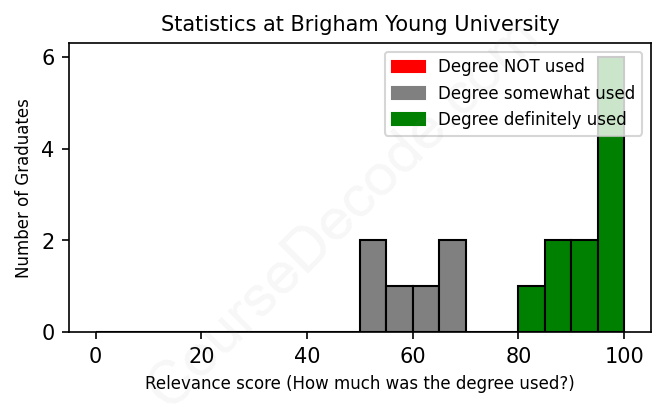
First, some facts. Of the Statistics graduates from Brigham Young University we've analyzed , here's how many have used (or NOT used) their degree in their career:

These are estimates based on AI analysis of 17 LinkedIn profiles (see below).
The verdict? Significantly above average. Overall, with an average relevance score of 81%, Statistics graduates from Brigham Young University have a much higher likelihood (+14%) of finding work in this field compared to the average graduate across all fields:
And for comparison, here's the chart for all profiles we've looked at across all degrees.
Also, after graduating, 35% of these graduates have pursued further education other than another Bachelor's degree (such as a Masters degree or other), which is right in line with the average across all fields.
See the details:
|
Relevance score: 86% We think this person has gone into a career highly relevant to their degree. We think this person has gone into a career highly relevant to their degree.
DEGREE INFOGraduated in 2020 from Brigham Young University with a Bachelor of Science - BS in Statistics. Also pursued further education since (see below). JOB HISTORY SINCE GRADUATIONPharmacy Technician Meds In Motion Pharmacy Jan 2020 - Sep 2020 Data Analyst Intern  University of Utah Jun 2020 - Jan 2021 Analyst I, Portfolio Management Strategy  Merrick Bank Jan 2021 - Aug 2022 Credit Risk Analyst  Ascent Funding Jul 2022 - Mar 2024 Senior Business Data Analyst  Ascent Funding Feb 2024 - Present FURTHER DEGREES DONE SINCE GRADUATINGMaster of Business Administration - MBAUniversity of Utah 2023 - 2025 ABOUTCurrent employee at Ascent Funding as a Senior Business Data Analyst. B.S. in Applied Statistics from Brigham Young University. Current MBA prospect at the University of Utah. |
The top 10 most common jobs done by the graduates we've analyzed (ranked most common to least) are:
Here is a visual representation of the most common words in job titles for Statistics graduates (this is across all Statistics graduates we've analyzed, not just those who went to Brigham Young University):

Overall, graduates from Brigham Young University's Statistics program seem to have taken a pretty solid path after graduation. Right out of school, many of them kick off their careers in data-focused roles like analysts or data scientists, which makes sense given their background. For instance, recent graduates have quickly landed jobs at well-known companies like Allstate, Morgan Stanley, and even at health-focused organizations like the Mayo Clinic. This trend shows that they're entering fields where they can apply their statistical skills directly, which is great because it indicates they're finding jobs relevant to their studies right away.
Fast forward five to ten years, and the picture looks quite promising as well. Many of these alumni seem to have climbed the career ladder, moving from junior positions to mid-level roles, and some have even become team leads or senior data scientists. The tech industry, especially, is well represented among these graduates, with many moving into software engineering roles. Even those who initially ventured into roles like teaching or copywriting seem to have made their way back into data-centric careers, illustrating a common trend of finding their niche. While there are a few who took a more winding path, overall, the data indicates that a degree in Statistics from BYU sets graduates up for solid careers in relevant fields, reinforcing the value of their education in making meaningful career moves.
Honestly, a Bachelor’s degree in Statistics can be kind of challenging, but it really depends on your interests and strengths in math. At Brigham Young University, you'll be diving into a lot of math and data analysis, which can get pretty intense, especially if you're not used to that kind of stuff. There are definitely some tough courses, especially in probability and advanced statistical methods, but if you like working with numbers and patterns, you might find it rewarding. Overall, it's probably on the tougher side compared to some other majors, but if you're motivated and willing to put in the work, you can totally handle it!
Most commonly, in the LinkedIn profiles we've looked at, it takes people 5 years to finish a Bachelor degree in Statistics.
Looking at these BYU grads, it seems like they've landed some pretty solid jobs overall, especially for fresh graduates. Many of them started in entry-level positions or internships, which is totally normal, but they've been able to move up into roles like data scientists, consultants, and analysts at reputable companies, which usually pay decently well. Some are even working at big names like Morgan Stanley and Mayo Clinic, which is a good sign for their earning potential! However, there are still a few who spent some time in less lucrative roles, like teaching or internships, so their earnings might not be as high right off the bat. Overall, it's a mixed bag, but most of these folks seem to be on a promising path to making good money as they gain experience.
Here is a visual representation of the most common words seen in the "about" section of LinkedIn profiles who have a Bachelor degree in Statistics (this is across all Statistics graduates we've analyzed, not just those who went to Brigham Young University). This may or may not be useful:

Here are all colleges offering a Bachelor degree in Statistics (ordered by the average relevance score of their Statistics graduates, best to worst) where we have analyzed at least 10 of their graduates:
| College | Score | Count |
|---|---|---|
 University of California, Los Angeles University of California, Los Angeles
|
87 | 12 |
 Brigham Young University Brigham Young University
|
81 | 17 |
 University of Illinois at Urbana-Champaign University of Illinois at Urbana-Champaign
|
81 | 10 |
 California Polytechnic State University-San Luis Obispo California Polytechnic State University-San Luis Obispo
|
79 | 14 |